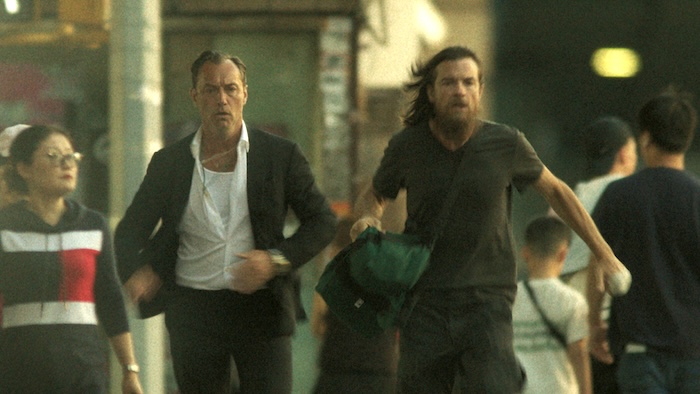By Dustin Rowles | TV | September 23, 2025

Spoilers for Black Rabbit
There are those among us who have known people like Vince Friedken (Jason Bateman) in The Black Rabbit: a charming screw-up who somehow ruins everything he touches, yet whose most redeeming quality is that he wants to be a good person. And because we know they want to be good, and because they’re so charming and earnest in their efforts, we let their best intentions drag us down with them. They’re the kind of people we remain loyal to until the bitter end, though some days that end can’t come soon enough to relieve us of the burden—the anchor—that keeps us weighed down. Sometimes it’s a best friend, sometimes a brother, a parent, or even a child.
That’s the story of Black Rabbit. Vince is that person to his younger brother Jake (Jude Law), a world-class screw-up who drags down not only his brother, but also his daughter, his friends, his coworkers, and even his creditors. He’s a drag on society, but not a bad man — just someone convinced his big break, his new beginning, his happiness is always just around the corner. Yet even if it arrived, he wouldn’t know what to do with it. His life is a never-ending series of bad choices.
In Black Rabbit, Vince tries to sell rare coins he stole from his mother but gets robbed in the process. In a fit of rage, he runs over one of the robbers — twice — killing him. Broke and with nowhere to turn, Vince heads back to New York City, where he once co-owned a restaurant, The Black Rabbit, with Jake. He left after being forced to sell his share when one of his reckless choices left a friend paralyzed.
Back in New York, he’s immediately confronted by another mistake: an outstanding $140,000 gambling debt to Joe Mancuso (Troy Kotsur). Vince promises repayment after selling his late mother’s house, but when that deal collapses, he begs for more time. Jake soon gets roped in, cooking up schemes to pay off the debt, including staging a fake charity dinner at the restaurant and pocketing the proceeds.
But Jake is a screw-up, too. Instead of paying Mancuso back, he uses the money to prop up the failing restaurant. Desperate to avoid retribution, Jake offers Mancuso’s men a deal: $1.5 million in jewelry will be at the restaurant at a set time, and he’ll make it easy to steal. They can fence it, and Jake collects the insurance. Win-win.
A twist spares Jake — temporarily. A blackmail payout from a wealthy artist who raped a bartender allows him to settle the debt and call off the heist. But Mancuso’s son, Junior, refuses to back down, recruiting Vince (after a falling out with Jake) to carry out the robbery. And because Vince is involved, the plan inevitably implodes. Jake’s best friend is killed, a sous chef is shot, and Vince is forced to kill Junior to save Jake.
From there, the spiral accelerates. Mancuso vows revenge, kidnaps Vince’s estranged daughter as leverage, and murders Vince’s closest friend, Matt. The police, meanwhile, pin Matt’s death on Vince, and soon both the cops and the mob are hunting him. (Mancuso also strongly hints he may be Vince’s biological father.)
The final episode is a relentless chase, with Jake scrambling to help his brother. But Vince finally accepts the truth everyone else has long known: he’s the rotten apple that spoils the bunch. The only way to save his brother, his daughter, and anyone else caught in his wake is to remove himself from the equation.
And so he does. Vince takes a header off the roof of The Black Rabbit, ending his life. It’s cruel, maybe, but also a release. With Vince gone, everyone else finds peace. A closing montage shows the survivors moving on. Even Jake, somehow shielded from responsibility, escapes his cursed restaurant — a chain around his neck as much as his brother was. Stripped of both, Jake is free to live simply as a dad and a bartender. And that, at last, is enough.